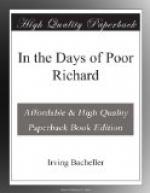The boy began skating straight toward the shore, drawing the sled and its load, Solomon kicking out behind with his spiked boots until they were well under way. They heard the east sheet breaking up before they had made half the distance to safe footing. Then their own began to crack into sections as big “as a ten-acre lot,” Mr. Binkus said, “an’ the noise was like a battle, but Jack kept a-goin’ an’ me settin’ light an’ my mind a-pushin’ like a scairt deer.” Water was flooding over the ice which had broken near shore, but the skater jumped the crack before it was wider than a man’s hand and took the sled with him. They reached the river’s edge before the ice began heaving and there the sloped snow had been wet and frozen to rocks and bushes, so they were able to make their way through it.
“Now, we’re even,” said Solomon when they had hauled the sled up the river bank while he looked back at the ice now breaking and beginning to pile up, “I done you a favor an’ you’ve done me one. It’s my turn next.”
This was the third in the remarkable series of adventures which came to these men.
They had a hearty welcome at the little house near The King’s Arms, where they sat until midnight telling of their adventures. In the midst of it, Jack said to his father:
“I heard a speaker say in Boston that the dragon’s teeth had been sown. What does that mean?”
“It means that war is coming,” said John Irons. “We might as well get ready for it.”
These words, coming from his father, gave him a shock of surprise. He began to think of the effect of war on his own fortunes.
3
Solomon sent his furs to market and went to work on the farm of John Irons and lived with the family. The boy returned to school. After the hay had been cut and stacked in mid-summer, they were summoned to Boston to testify in the trial of Preston. They left in September taking with them a drove of horses.
“It will be good for Jack,” John Irons had said to his wife. “He’ll be the better prepared for his work in Philadelphia next fall.”
Two important letters had arrived that summer. One from Benjamin Franklin to John Irons, offering Jack a chance to learn the printer’s trade in his Philadelphia shop and board and lodging in his home. “If the boy is disposed to make a wise improvement of his time,” the great man had written, “I shall see that he has an opportunity to take a course at our Academy. I am sure he would be a help and comfort to Mrs. Franklin. She, I think, will love to mother him. Do not be afraid to send him away from home. It will help him along toward manhood. I was much impressed by his letter to Miss Margaret Hare, which her mother had the goodness to show me. He has a fine spirit and a rare gift for expressing it. She and the girl were convinced by its argument, but the Colonel himself is an obdurate Tory—he being a favorite of the King. The girl, now very charming




